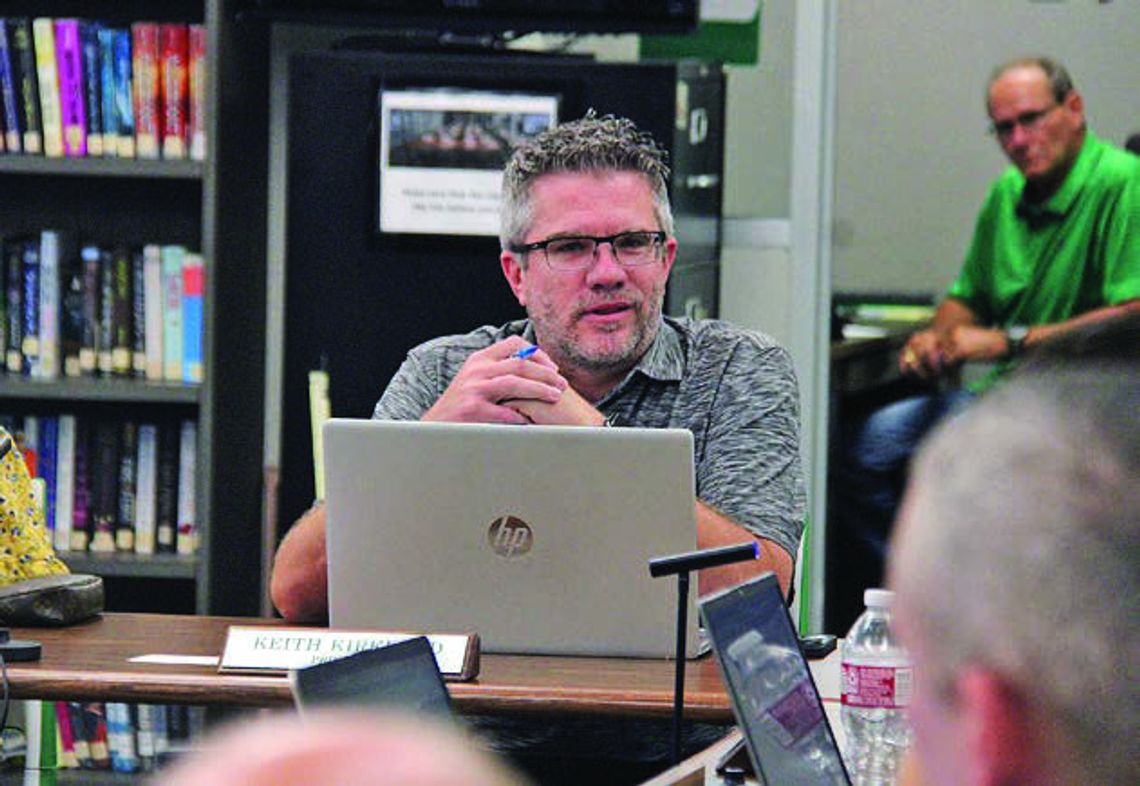Tioga ISD will require students to store their phones and other personal communication devices in their backpacks all day in light of the state's new mandate regarding such devices.
The TISD administration interprets the new law to allow the district to designate backpacks or lockers as the storage option.
'House Bill 1481 reads basically that the device is not to be present during the school day,' Tioga High School Principal Keith Kirkland said. '… In a perfect world, they would be at home from 7:40 … to 3:45. We all know that's not going to happen.'
Allowing backpacks to be the storage option should help alleviate students bringing a burner phone to put into a school storage option as well as prevent logistical issues, Kirkland added.
That also means students can still communicate with their parents before or after school when they are participating in activities.
The penalties, required by the state, will be announced with the annual Code of Conduct updates, if not before.
Texas also changed the law regarding districts assigning DAEP for possession of e-cigarettes.
'That's been in the news for years now, and has created an overpopulated DAEP placement,' Superintendent Josh Ballinger said. 'When you send that many kids to mandatory DAEP, that makes the bell curve kind of out of whack when it comes to why are Texas kids getting in so much trouble, so they essentially revoked that.'
The school board voted to opt out of allowing homeschool students to participate in extracurricular activities, which matches its approach for the past few years when it opted not to opt in to the program before.
Before the unanimous vote was cast, board Vice President Trina Colteryahn asked a few questions regarding the state law change that now requires districts to opt out of opening their programs instead of opting in.
'There are some people who homeschool for various reasons, and it's not a setback financially,' she said.
Based on information published by the Texas Home School Coalition, school districts can opt to only accept homeschool students who live within their boundaries, can require homeschool students to try out like their public school counterparts and can change their policy for future years.
The information also says there is an allotment of $1,500 per each student per activity the student participates in.
The state allotment per student is $6,210 total.
Ballinger and board President Dallas Slay steered the conversation toward opting out of the program.
'We're a public school; we want them here,' Ballinger said. 'We want to get homeschool students … to be here with us. My concern would be if we allow them to still participate in a lot of the reasons why they come to school, but be homeschooled, that's going to affect our enrollment. So, if a student really wants to participate in activities, in my opinion, be here in school with us learning and that is what the true aspect of extracurricular is.'
Slay worded it a different way.
'If our schools aren't good enough for your kids to attend, then they're not good enough for your kids to play at,' he said, adding that he wouldn't want a starting spot to go to a homeschool student over an enrolled student. '… That's not fair to our students.'
Also at the meeting, Ballinger spoke about the Seat 5 vacancy caused by Dugan Rainey's resignation.
He pointed out that Holly Mizer was present for the meeting, and Bob Wishmeyer was not.
'It's time to do something with this position,' Ballinger said, adding that the board policy gives a sixmonth window from Rainey's April 21 resignation to appoint someone to the unexpired term.
Ballinger also gave a snapshot view of House Bill 2, which will impact school funding.
'A really good TEA document came out,' he said. 'Anyone can get on their website and sign up for their Listservs. … If you want a school finance 101 document, that is basically what that is, and it explains in written form instead of a bunch of formulas and spreadsheets thrown at you what not only House Bill 2, how that's going to intertwine with everything to do with school finance, but also just the general terms of what everything means.'
He added that state funding makes up roughly 75% of the district's operating budget.
Ballinger also said that the summary of finance documents from the state line up fairly well with the budget that began July 1, including the almost $400,000 for raises approved after the executive session Monday night.
'They went ahead and adjusted our [average daily attendance] down without me even prompting them,' Ballinger said. 'It's still a little bit high, but once again, we've already covered the basics. You can be a little low and still come out OK with what you are going to get paid.'
The board directed the principals to come up with incentives to encourage higher attendance rates, including shifting the focus from only celebrating perfect attendance.
Ballinger also mentioned a future discussion about changing lunch prices and whether to charge for breakfast that will come before the trustees in August.

















